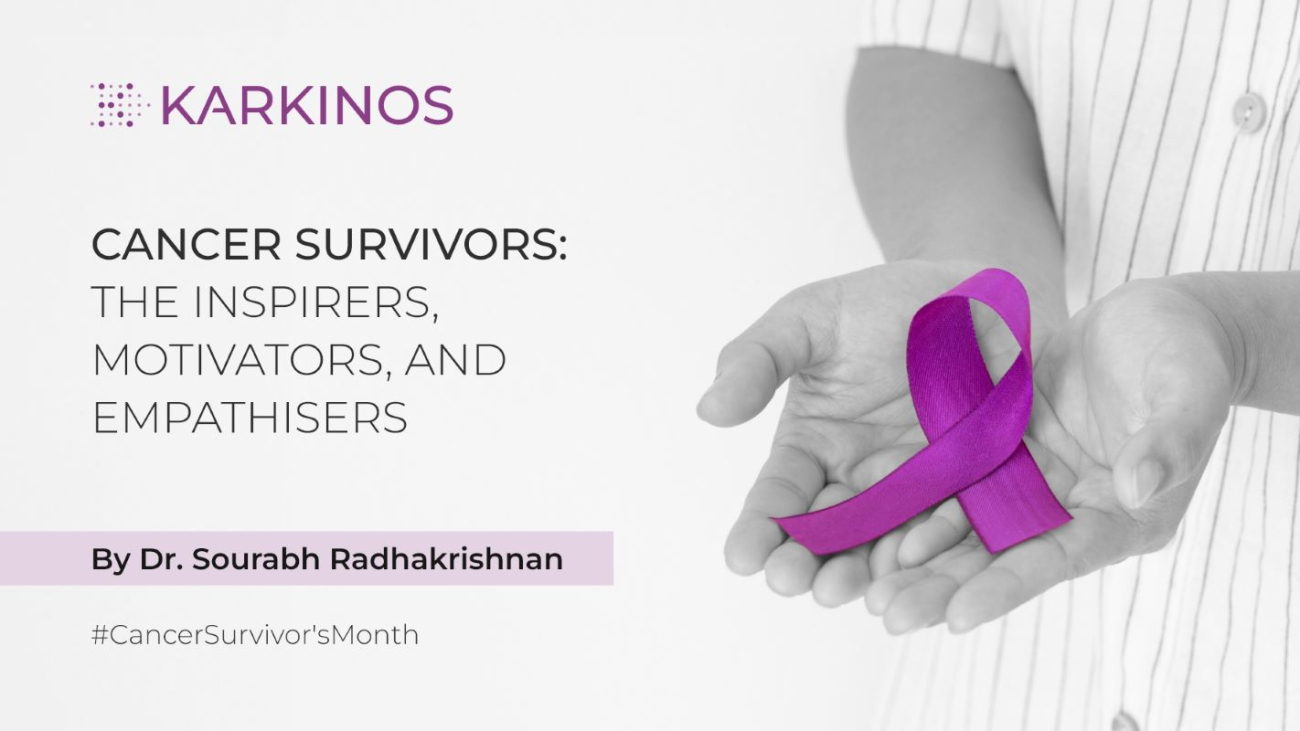How can cancer survivors prevent other cancer patients from dropping out of treatment?
By Dr. Sourabh Radhakrishnan, Senior Consultant and Director, Medical and Precision Oncology, Karkinos Healthcare
Quality of Life (QoL) – if one wants to truly understand what QoL means then it has to be inquired with a cancer survivor. Life with cancer is not easy and that when diagnosed at its late stages is even more agonizing, colossally upsetting the QoL. The umpteen trips to hospitals and the numerous consultations with doctors is exhausting beyond explanation. The person is left tormented throughout the treatment cycle, while being distraught and psychologically affected. Surgical procedures are painful, and we have personally seen many cancer sufferers slip into depression and experience a feeling of regret when undergoing chemotherapy or radiation therapy. To make it worse, the side effects of cancer treatment like loss of hair, excessive vomiting, indigestion, loss of appetite, skin irritation and rashes, all makes the cancer sufferer’s condition terrible to endure.
Despite these hardships, every day, thousands of people successfully survive from the wrath of cancer, proving that this disease is not a death sentence. A significant increase in community cancer screening programmes and early cancer diagnosis have helped detect cancer at a stage that is manageable to yield better treatment outcomes.
Cancer survivors who have been through this early cancer diagnosis and have experienced early-stage treatment procedures are the greatest patient advocates, who radiate a positive outlook to citizens of a community or to cancer fighters. They say it is best to hear from the horse’s mouth. Like that, cancer survivors, when they narrate their own experiences of survival, it acts as a convincing way to motivate cancer fighters to adhere to treatment requirements.
Survivors live to tell a tale in many positive ways. Their resilience is seen when they undergo physical and occupational therapy support that aids in their recovery and to regain functionality. These post treatment therapies are crucial in helping survivors rebuild their strength, restore mobility, and enhance their overall QoL. Their adherence to regular follow-up appointments with healthcare professionals, including oncologists, rehabilitation specialists, and therapists forms the most important factor in defeating cancer.
There are several research studies from global cancer institutions that prove the effectiveness of survivors and how they play a significant role as advocates for cancer patients by raising awareness, promoting early detection, and advocating for improved access to healthcare services. By sharing their own experiences and actively working to improve the cancer care system, survivors can contribute to a more supportive and inclusive environment for all patients.
Thus, cancer survivors play an important role in supporting other cancer patients and helping them stay committed to their treatment. Cancer survivors can help prevent cancer patients from dropping out of treatment in a number of ways. Mainly by sharing their own survival stories and experiences with other patients, highlighting the challenges they faced during treatment and how they managed to stay motivated. Sharing these stories can inspire hope and provide reassurance that they are not alone in their journey.
Cancer survivors can also offer emotional support to newly diagnosed patients by lending a listening ear, offering empathy, and understanding their fears and concerns. Expressing a compassionate feeling towards cancer patients can help them feel supported and encourage them to continue their treatment. They can be reassured on the effectiveness of the treatment and advise them to be tolerant while the medicine is administered through a course period.
Survivors can provide practical tips and advice to patients regarding managing side effects, dealing with treatment-related challenges, and maintaining a healthy lifestyle during and after treatment. This guidance can help patients navigate their treatment journey more effectively. Survivors can also help connect patients with relevant resources such as support groups, counselling services, educational materials, and online communities. These resources can provide additional support, information, and a sense of community, which can be vital in preventing patients from feeling isolated or overwhelmed.
In many cases, we have seen cancer survivors volunteering to be mentors to newly diagnosed patients, offering ongoing support and guidance throughout their treatment. This one-on-one relationship can provide patients with a sense of guidance, encouragement, and accountability, helping them stay on track with their treatment plan.
A few cancer survivors with keen interest to actively involve themselves (like doctors/physicians who are themselves cancer survivors) can collaborate with healthcare professionals to develop patient support programmes, participate in survivorship clinics, or volunteer at hospitals and cancer centers. This collaboration can enhance the overall patient experience and provide a seamless continuum of care and restore the pre-cancer QoL.
That said, survivors cannot get pushy with their agenda on cancer fighters. As every individual’s journey with cancer is unique it’s important to respect each patient’s choices and decisions regarding their treatment. The goal, therefore, is to provide emotional support, guidance, and encouragement while empowering patients to make informed decisions about their healthcare.

 Dr. Sourabh Radhakrishnan has 15 years of experience as a medical oncologist. He has worked in the departments of Medical Oncology including Pediatric Oncology and Stem Cell Transplant of both Tata Memorial Centre and AIIMS. He is recognized for administering treatment from first clinical assessment of the patient to planning appropriate investigations, deciding the treatment, monitoring of chemotherapy, management of toxicities, response evaluations and follow-ups.
Dr. Sourabh Radhakrishnan has 15 years of experience as a medical oncologist. He has worked in the departments of Medical Oncology including Pediatric Oncology and Stem Cell Transplant of both Tata Memorial Centre and AIIMS. He is recognized for administering treatment from first clinical assessment of the patient to planning appropriate investigations, deciding the treatment, monitoring of chemotherapy, management of toxicities, response evaluations and follow-ups.